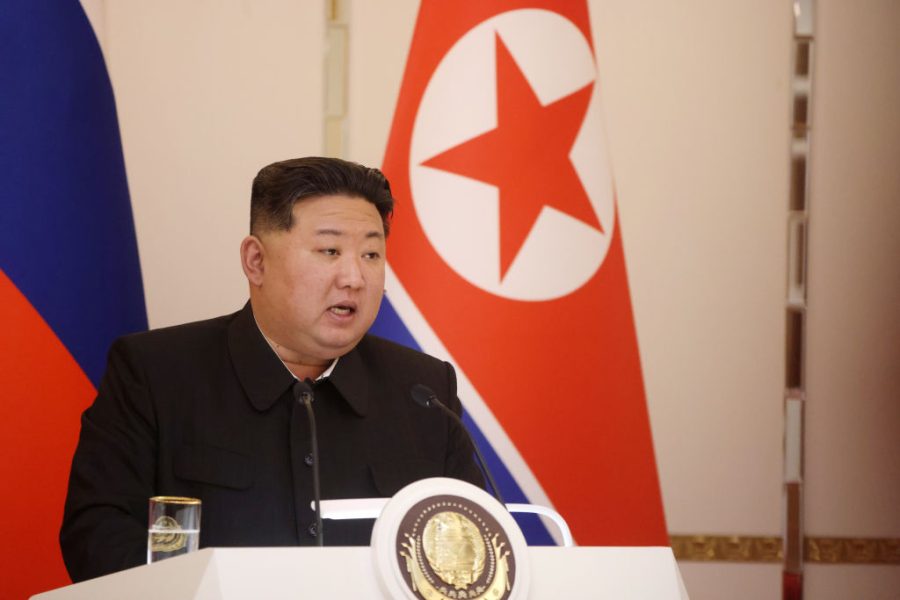When analysing authoritarian states, not least North Korea, most of the time we have to read between the lines. But on other occasions, things are more obvious. Today, China celebrates eighty years since its victory over Japan in the second world war. Xi Jinping has invited Western and non-Western leaders past and present, but all eyes will be on the guest list’s top two invitees: Vladimir Putin and Kim Jong-un.
Marking the first multilateral gathering of all three leaders since the Cold War, today’s spectacle aims to send a clear signal to the West. Xi, Putin, and Kim might have their differences in foreign policy priorities, their relations may fluctuate, and they lack a formalised alliance. But despite this, any chance to portray a united anti-Western front in full view of the world, and in so doing, delegitimise the United States and its allies, is too good of an opportunity to resist.
It is plausible that China did not expect North Korea to become one of Russia’s lifelines in Ukraine
Kim Jong-un’s train trip to Beijing – just like his father, Kim Jong-il, he hates flying – shows how, just as his grandfather did during the Cold War, he must leverage every possibility to reap rewards from both Russia and China for the hermit kingdom whilst fraying the US’s relationship with South Korea. But even before North Korea’s rapprochement with Russia in the wake of Moscow’s invasion of Ukraine, Pyongyang’s ties with Beijing were hardly firing on all cylinders.
Kim Jong-un took power in December 2011 following his father’s death and kept Xi Jinping waiting for nearly seven years before the two leaders met for the first time in March 2018, a decision which will hardly have gone unnoticed in Beijing. Amidst the summitry throughout 2018 and 2019 between Donald Trump and Kim, as well as between Kim and the then-South Korean President Moon Jae-in, Xi would become a useful sounding board before and after these meetings. For all China’s dislike of North Korea’s nuclear weapons, Beijing continued to funnel cash into the Kim regime’s coffers, helping Pyongyang evade sanctions by facilitating crude oil shipments and accepting North Korean workers en masse.
Today’s encounter between Kim and Xi marks the first face-to-face meeting between the two leaders in nearly six years. Part of this delay can be attributed to Pyongyang’s self-imposed border closure in January 2020 owing to coronavirus, which lasted for over three years. Yet, the Kim regime has also capitalised upon the Ukraine war to diversify beyond its principal economic benefactor of China. The heightened cooperation between Moscow and Pyongyang – surpassing its initial cash-for-artillery exchange –following Putin’s invasion of Ukraine has led many observers to conclude that relations between the hermit kingdom and the middle kingdom have plummeted. As a result, so the argument goes, China is angry with its nuclear-armed neighbour and wants to force Pyongyang to re-prioritise ties.
Such a view, however, reeks of simplicity. Yes, it is highly plausible that China did not expect North Korea to become one of Russia’s lifelines in the Ukraine war, not least by sending approximately 14,000 North Korean troops to assist Russia’s fight, with the first deployment being sent in October 2024. Moreover, when only months earlier, Russia and North Korea signed a mutual defence treaty on 19 June, China lost its status as North Korea’s sole treaty ally (the two countries had signed a mutual defence pact in 1961). Beijing was certainly not dancing for joy at both eventualities.
Yet, whilst China may be nauseous about the Russia-North Korea relationship, Xi Jinping is hardly shaking with rage. China wants to retain influence over the Korean Peninsula – after all, Beijing (and not Moscow) was one of the signatories of the Korean War armistice agreement in 1953 – but continues to supply Russia with dual-use technologies, allow Russian weapons factories to operate in China, and abet North Korea in circumventing sanctions. Were Beijing actually angry, it could simply stop assisting its Russian and North Korean comrades.
What is more, whilst North Korea and Russia’s international reputations continue to slide amidst the exchange of North Korean troops for Russian military technology, Xi can, for now, sit back and avoid the same wrath, all the while China maintains its economic ties with the West. The last thing China wants is for North Korea to become engulfed in a war that Beijing would be treaty-bound to enter were Pyongyang to come under attack. Yet, if you think that Xi would not use an opportunity to gain leverage over Donald Trump by hosting one of the most public displays of an anti-Western axis to date, then think again.
As leaders of rogue and non-rogue states alike gather to watch China parade new and advanced weapons, Beijing will want to eschew any doubt of its intention and ability to modernise its military. Yet, all cameras will be on the two men who will flank Xi Jinping, watching these weapons pass by: Putin on his right and ‘Little Rocket Man’ Kim Jong-un on his left.
Russia, China and North Korea are not in a formalised trilateral alliance per se, nor do they have identical foreign and domestic policies. But the worst conclusion that the West can draw is that this unholy triumvirate is no big deal. If Russia continues to provide North Korea with missile and military technology and China continues to pursue ‘reunification’ with Taiwan – whatever such a contingency might look like – then the West and our allies and partners (not least South Korea) will not have time to sit idly by. It is about time that we took seriously the threat of an increasingly nuclear North Korea supported by Russia and China.







Comments